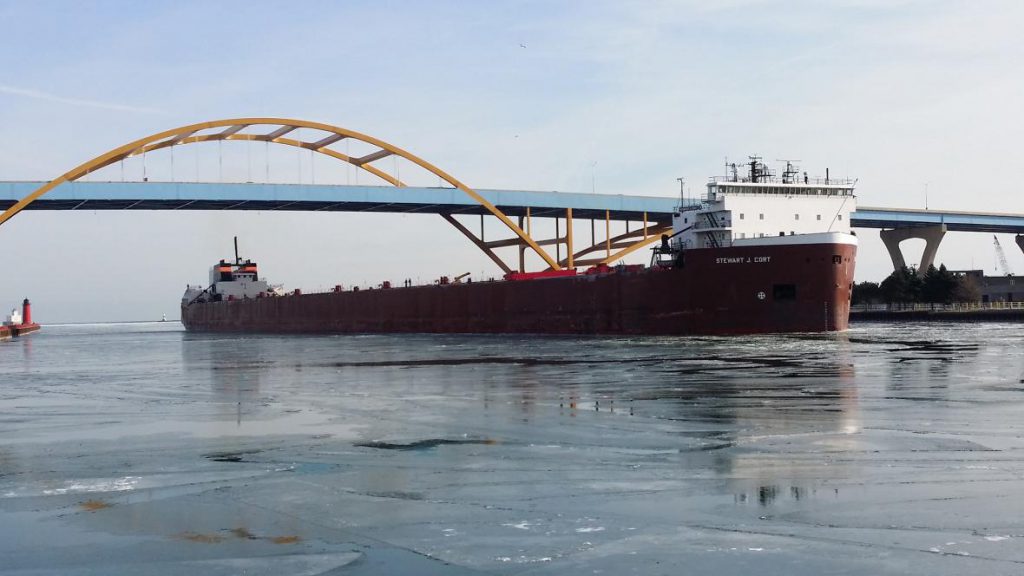Wisconsin Ethanol By-Product To Feed the World
First-of-its-kind export facility on the Great Lakes will take trucks off the road, make Midwest ethanol more competitive.

The Great Lakes freighter Stewart J. Cort passes through the Port of Milwaukee in 2017. Photo courtesy Port of Milwaukee.
A by-product of ethanol manufacturing used to feed farm animals will soon be shipped across the world from Milwaukee’s port. A public-private partnership will construct a $31.4 million agricultural export facility, the first of its kind on the Great Lakes, to enable Wisconsin’s nine ethanol plants and others in southern Minnesota, northern Iowa to ship the product to regions without the necessary water to grow animal feed.
City-owned Port Milwaukee is partnering with Clinton-based DeLong Company to construct an intermodal Agricultural Maritime Export Facility (AMEF) on a 3.8-acre site on the Inner Harbor. The project will be funded by a $15.9 million federal grant, awarded this week, as well as $4.3 million from the port, $6.3 million from DeLong and $4.9 million from a Wisconsin Department of Transportation harbor grant program.
“This investment adds a new dimension to Port Milwaukee’s role as a connector of Wisconsin’s businesses and farmers to world markets,” said Mayor Tom Barrett in a statement announcing the federal grant.
“I worked to secure this investment in our transportation infrastructure so that we can expand farmers’ access to international markets, create jobs for Milwaukee workers and help grow our Made in Wisconsin economy,” said U.S. Senator Tammy Baldwin of the federal grant.
A Port Milwaukee report notes that Milwaukee’s port is strategically positioned to have a positive regional impact. Six of Wisconsin’s nine ethanol plants currently truck DDGS past Milwaukee to an intermodal facility in Joliet, Illinois where standardized shipping containers are available.
The report, submitted to secure the federal grant, notes that shipping via the port will reduce both shipping costs for ethanol producers and traffic congestion in Chicago, and also mitigate a reduction in the number of available shipping containers caused by new tariffs. An estimated 1,600 truck trips are estimated to be eliminated as part of the proposal. The report also notes that shipping containers are not ideally suited for DDGS because of the moisture content of the product.
The project partners hope to export 200,000 metric tons annually, approximately $40 million worth of the product. The AMEF will be set up to supply Handymax-sized vessels capable of holding 30,000 metric tons of DDGS.
The new facility will replace an unused building in the 467-acre port. A new rail line servicing the AMEF will directly connect the system to Union Pacific and Canadian Pacific‘s rail network. An ethanol export facility already exists at the port.
The $31.4 million project, estimated by port director Adam Schlicht to be the largest investment in the port in decades, is planned to be operational in 2023.
Ethanol plants in the United States are capable of producing 15 billion gallons of ethanol and 44 million metric tons of DDGS per year according to a city report. DDGS was exported to more than 20 countries on five continents in 2018.
A lease with DeLong still needs Common Council approval for the project to proceed.
Port Milwaukee handled 2.67 million metric tons of cargo in 2019, an increase over its five-year average, according to a recent port announcement.
The number of cruise passengers continues to climb as well. The port reported 3,214 passenger visits through 10 cruise ship visits in 2019. This year is expected to bring 14 stops with more than 4,000 passengers. In January Viking Cruises announced it would use the city as a turn-around point 10 times starting in 2022 when it enters the Great Lakes market with a new ship.
If you think stories like this are important, become a member of Urban Milwaukee and help support real, independent journalism. Plus you get some cool added benefits.



















DDGS to feed livestock for the world! Not to family farms perhaps…maybe to the former Amazon rain forest now transformed into cattle country for the meat required by nations north of the equator.
…and the lakefront storms will increase in intensity… and FEMA will bail us out???? Rail and truck traffic to increase through our downtown??? expand the rail lines for commercial transport but not for mass transit for humans?
Ethanol is distilled from harvests from those things called farms that used to where we grew food for people ,now grown for our addiction to the convenience of the automobile. Humans take a beating again.
The industrial agriculture that creates this oversupply is oversupplying the CO2 in our atmosphere, destroying soil and local communities. The Pope just published his outcry of pain for the destruction of human communities in the Amazon. Here we can look to the same global corporate forces that have decimated the small family farm in rural Wisconsin in the name of profit not food security. Humans take a beating again.
When we decide for the immediate dollar – single bottom line- without looking at the externalized costs, and ecosystem benefits denied, and the human cost…we make a decision that will haunt the next generation – we have given up on the seventh generation.
Has anyone read the reports from IPCC or NCA …or, maybe heard Greta Thunberg?